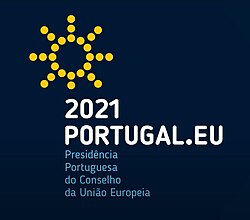| Portuguese Presidency of the Council of the European Union | |
|---|---|
 | |
| Council of the European Union | |
| Website | 2021portugal |
| Presidency trio | |
| ||
|---|---|---|
Personal  | ||
The 2021 Portuguese Presidency of the Council of the European Union (PPUE2021) was Portugal's fourth presidency of the Council, held between 1 January and 30 June 2021. Portugal held its first presidency from 1 January until 30 June 1992.
Contents
Portugal is part of the 10th Presidency Trio, together with Germany and Slovenia, with which it is working in close trilateral cooperation. This trio is the first in the second cycle of presidencies. [1]

